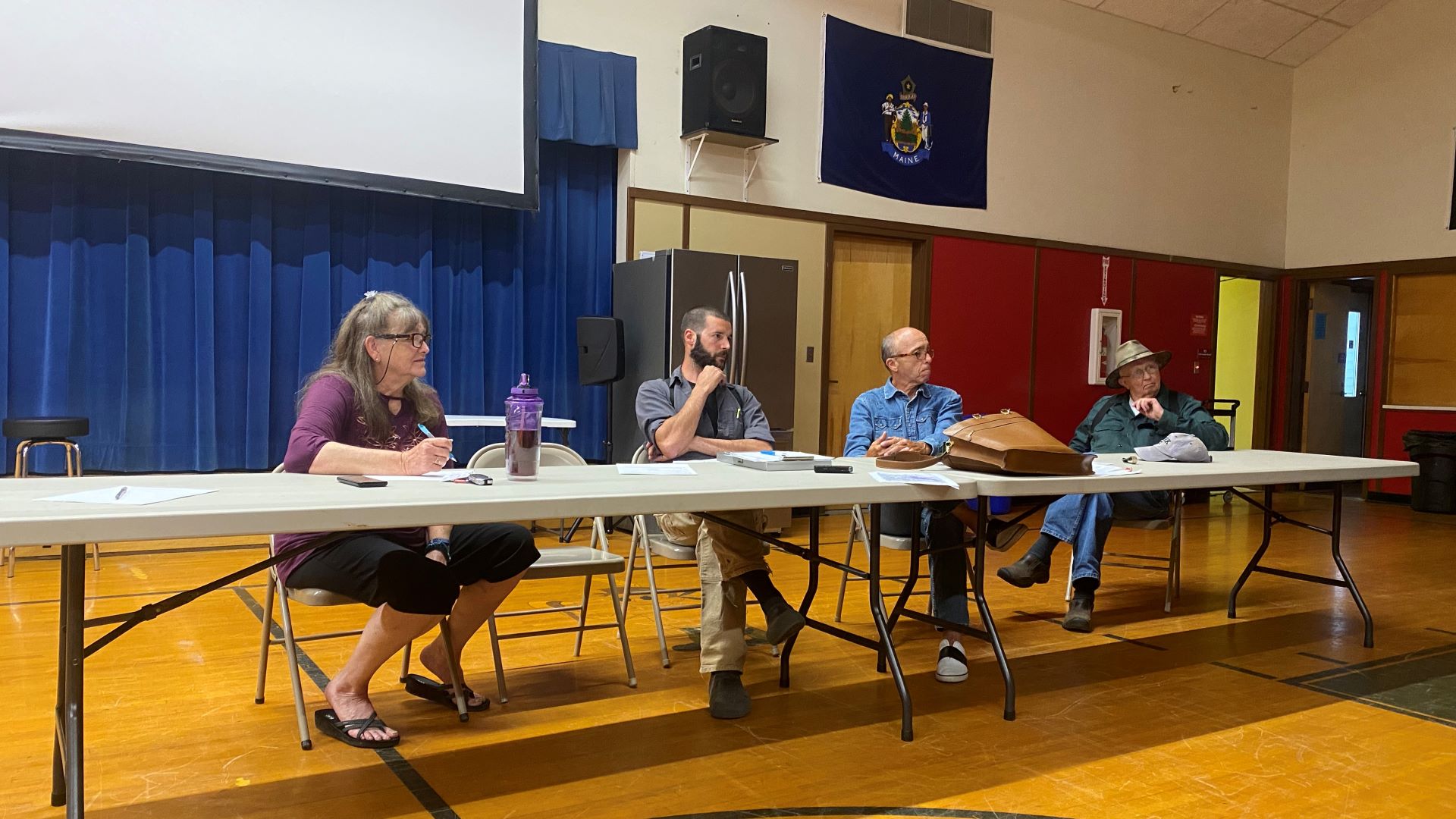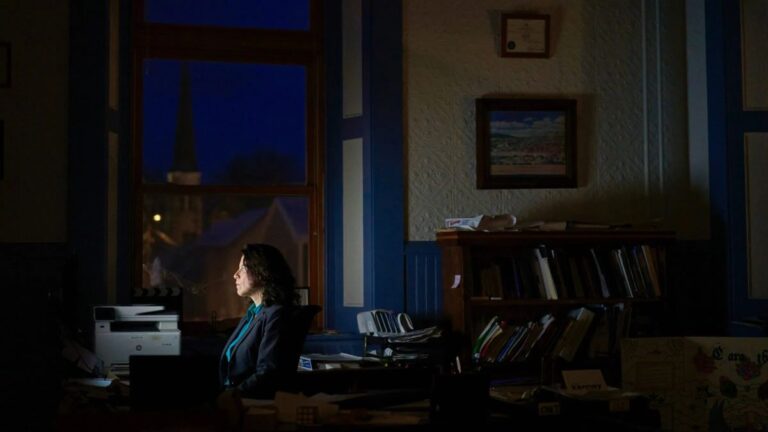Town officials in Columbia Falls on Tuesday began laying the groundwork for a moratorium on large-scale developments like the proposed Flagpole of Freedom Park, as their attorneys sketched out a timeline that would have voters consider the measure in March.
If approved by voters, the moratorium would give town officials time to develop zoning, traffic, and other regulations by delaying large-scale projects in Columbia Falls until at least June. Town attorney Aga Dixon said the Select Board could vote to extend the moratorium if more time is needed to close what she called sizable “gaps” in the town’s comprehensive plan.
“No matter what kind of proposal comes before this community of any large scale,” Dixon said. “There are significant risks to this community in terms of overwhelming your public infrastructure, your public services, and changing the character of this community.”
Speaking to about thirty Columbia Falls and neighboring community residents, town officials stressed that the moratorium was not specifically aimed at the $1 billion Flagpole of Freedom Park project, which was proposed by Worcester Resources this spring and subsequently put on hold.
Citing it only as an example, Dixon said that if the flagpole project comes back to the Select Board, it would have its own timeline. That would include a town vote on annexation, followed by another vote on regulations dictating if or how the project might be allowed.
Several in attendance asked questions — many indirectly aimed at the stalled flagpole park. Concerns about impact to the environment and the town’s rural character topped the list.
“I wondered if there’s legal language in the moratorium around issues of noise or sound, chemical or toxic waste, you know, lighting, air visual impact or buffers,” long-time Columbia Falls resident Mary Anderson asked via Zoom.
“We’re not there yet. We’re far from that point,” Dixon said. “This is a temporary bandage to allow the town time to address exactly those kinds of issues.”
Noticeably silent in the audience, however, was Rob Worcester, co-founder of the Flagpole of Freedom Park. Earlier this month, the company’s attorney said a moratorium would be “devastating” as the developers seek to attract funders to the project.
After Tuesday’s meeting, Worcester said the developers are in the process of re-organizing and still weighing options, calling the situation, “fluid.”
“I think it’s good for the town to do their planning and whatnot,” Worcester said. “I do think it discourages the project a little bit, and it might lead to our decisions.”
The company’s slowdown is a stark contrast to its initial urgency, starting with a push that secured special legislation passed this spring to allow Columbia Falls to annex 10,400 acres of land for the project, and a projected park opening on July 4, 2026.
The anticipated opening, along with funding for the project, began “slipping” after veterans’ groups and other potential partners apparently balked at the company’s announcement that it wanted to operate the patriotism-themed development as a for-profit enterprise. In August, the company paused the project for 4-8 weeks.
Town officials have signaled they too will take as much time as needed. They plan to have a package of proposed regulations and ordinances ready for voters to consider, tentatively, for the statewide vote in November. But Select and Planning Board member Jeffrey Greene emphasized that none of the dates are set in stone.
“We need to do a lot more public outreach to find out if people want the moratorium, to make sure we’re doing the right thing,” Greene said.
The Select Board tentatively plans to vote on the measure in January, followed by a series of public hearings before the measure goes before residents in either a referendum or in an open vote at a town meeting. All dates are yet to be determined.
Meanwhile, with an open-ended timeline, and a team of three consultants, the cost for residents is mounting.
“We anticipated trying to keep it down to around $10,000 a month, but prior to this, it’s been over that,” Town Select Board Chairman Tony Santiago said.
The town previously asked that Worcester Resources pay $150,000 in advance to cover some of the town’s legal and consulting bills associated with the Park project. The company declined, despite Park literature claiming that the development would bring in annual associated state tax revenues of $27 million.
Rob Worcester has described the Park as “part national monument, art historical adventure, immersive tech-driven museum and architectural wonder” that would include eight miles of loop roads, six miles of gondolas, several villages, campgrounds, a hotel, theater, restaurants and shops.
The “small city” of as many as 10,400 acres is projected to attract 6 million visitors and 5,000 employees, most of them year-round. As envisioned by the Worcesters, the flagpole would stand 1,776 feet above sea level, 300 feet taller than the spire of the Empire State Building.
The town’s proposed moratorium would temporarily limit developments to no more than 100 feet in height or three-acres of land.
Although town officials say the moratorium is not a ban on the Worcester project, they say preparing regulations to shore-up the town’s existing ones could prevent “serious public harm” from large-scale developments of that kind.
The Worcester family is also behind Wreaths Across America, a separate nonprofit that distributes wreaths to graves at Arlington National Cemetery.
Worcester Resources is not without blemish.
In August, The Maine Monitor reported that State environmental regulators issued a “Notice of Violation” against the developer after inspectors found the company built several dozen cabins, a restaurant, roads and parking areas without obtaining necessary permits. An area in excess of three acres had been stripped, graded and not revegetated, according to inspectors.
After being issued notice in July, Worcester officials said they were working with the Department of Environmental Protection to “fully resolve the potential concern.”
In a more recent development, The Maine Monitor also reported that court filings show that Worcester Holdings is owed $888,000 by a biomass company that recently filed for Chapter 11 bankruptcy protection.
Worcester Holdings is listed as one of dozens of creditors in the bankruptcy case filed by Stored Solar LLC and a number of its subsidiaries. Stored Solar filed for bankruptcy protection in September in Bangor.
In a statement, Worcester Resources said: “Flagpole of Freedom and Stored Solar are two different projects and neither has a direct or indirect impact on the other. We are optimistic that we will be made whole in the Stored Solar bankruptcy filing and we do anticipate working with that organization under new ownership in the future.”
Speaking at Tuesday’s meeting, Columbia Falls resident David Davison said he has serious concerns about the Park project.
“The Worcesters have been very secretive about it,” Davison said. “I understand that people can have big dreams, but their mechanism of no transparency has been ludicrous.”








